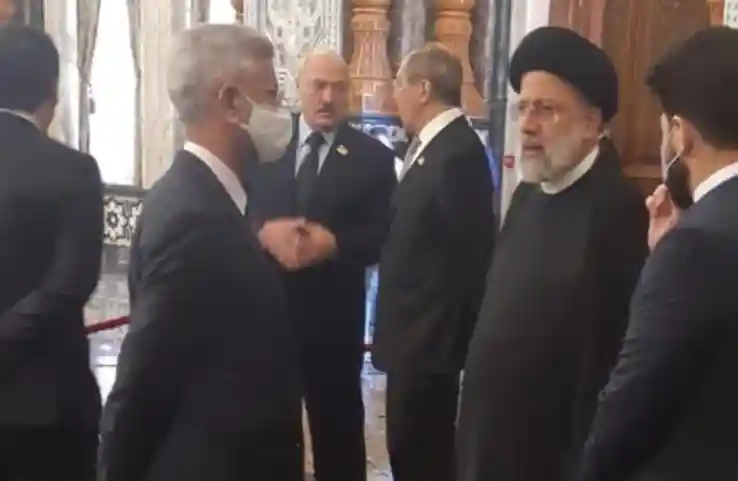

External Affairs Minister S Jaishankar with President of Iran, Ebrahim Raisi in Dushanbe, Tajikistan (Image courtesy: Twitter/@DrSJaishankar)
<p>
<strong>With the region caught in a geopolitical churn, the news of Iran becoming the ninth member of the Shanghai Cooperation Organisation (SCO) at the end of the Dushanbe summit on Friday hasn&#39;t exactly jolted many out of their sleep.</strong></p>
<p>
The change in Iran&#39;s membership status from observer to main had for long been work in progress, much before Iranian President Ayatollah Seyed Ebrahim Raisi landed in the Tajik capital for the 21st edition of the SCO meeting. &nbsp;<br />
<br />
While the organisation till now comprised eight member states, including India, Russia, China, Kazakhstan, Tajikistan, Uzbekistan, Kyrgyzstan and Pakistan, four countries – Iran, Afghanistan, Belarus and Mongolia – played the role of an observer state. Azerbaijan, Armenia, Cambodia, Nepal, Turkey, and Sri Lanka are the six dialogue partners.<br />
<br />
Fast-changing dynamics, along with the current situation in Central Asia following Taliban&#39;s return to power in Afghanistan, fast-tracked Tehran&#39;s entry in the cockpit where New Delhi, Moscow and Beijing are already working together to fly through the storm.</p>
<p>
<img alt="SCO Summit Dushanbe" src="https://www.indianarrative.com/upload/news/sco_summit.webp" style="width: 100%; height: 100%;" /><br />
<br />
As Raisi said in speech on Friday, through its &quot;vast potential&quot; in terms of geopolitics, population, energy, transportation, human resources, and most importantly spirituality, culture and civilisation, Iran can play a significant part in improving the strategic role of the SCO.<br />
<br />
<strong>Economic multilateralism and infrastructural links<br />
</strong><br />
Iran says that key projects in the field of infrastructural links, like the One Belt-One Road Initiative, the Eurasian Economic Union and the North-South Corridor, can play a big role in strengthening the common interests of developing countries and strengthening peace in the region.<br />
<br />
&quot;These projects are not competitors, but complement each other,&quot; said Raisi emphasising that Iran could be the connecting link between South and North Eurasia through the North-South Corridor, connecting Central Asia and Russia to India.</p>
<p>
The north-south corridor, according to him, can strengthen the convergence infrastructure in the form of the &#39;Great Eurasia&#39;. Iran is on the route of One Belt-One Road Initiative corridors, the China-Central Asia-West Asia Corridor, and could connect East and West Eurasia.<br />
<br />
Raisi also said that Iran&#39;s large port of Chabahar has the capacity to become an exchange centre for several member and neighbouring countries (most of them landlocked) in a special way, which, with the efforts of members, can be a symbol of cooperation of all members of the Shanghai Organisation.<br />
<br />
<strong>Common security<br />
</strong><br />
Iran, with a history of more than 40 years of relentless confrontation and fight against terrorism and extremism, has also extended its hand of cooperation to all SCO members for the realisation of peace in the region. Raisi said that the strategic partnership between Iran and Russia in Syria is a valuable experience and a successful model for future cooperation with other regional and supra-regional partners. This fight against terrorism, he said, should be done without foreign intervention. &quot;The Islamic Republic of Iran believes in common security and does not consider security to be segregated,&quot; said the Iranian President.<br />
<br />
<strong>Cultural connect<br />
</strong><br />
Iran believes that most of the world&#39;s cultural and spiritual treasury is located in Asia. &quot;Asia is the cradle of human civilisation and its beating heart has been in China, India, Tajikistan and Iran,&quot; Raisi said on Friday. Insisting that the &#39;crisis of spirituality&#39; is the foundation of all crisis in the world, Iran said that it can play an important role in the development of cultural regionalism. Stressing that the greatest Abrahamic religions have arisen in Asia, Iran told the SCO member states that the Asian culture and civilisation have always been associated with harmony, patience, politeness, mutual respect and benevolence.</p>
<p>
<strong>Also Read: <a href="https://www.indianarrative.com/india-news/sco-must-prevent-afghanistan-from-becoming-a-hotbed-of-terror-pm-modi-115398.html">SCO must prevent Afghanistan from becoming a hotbed of terror – PM Modi</a></strong></p>
The Indian Army showcases its prowess in the Plateau Sub Sector along the Line of…
The Indian Army has successfully concluded ARMEX-24, a high-altitude adventure expedition that stands as a…
The US Department of State, during its press briefing, addressed the questions on the rise…
The team of Indian Army's Field Hospital deployed in Mandalay under Operation Brahma returned to…
Defence Secretary Rajesh Kumar Singh visited Rome from April 14-15, 2025, to strengthen India-Italy defence…
India has rejected as "motivated and baseless" comments made by Pakistan on the Waqf Amendment…